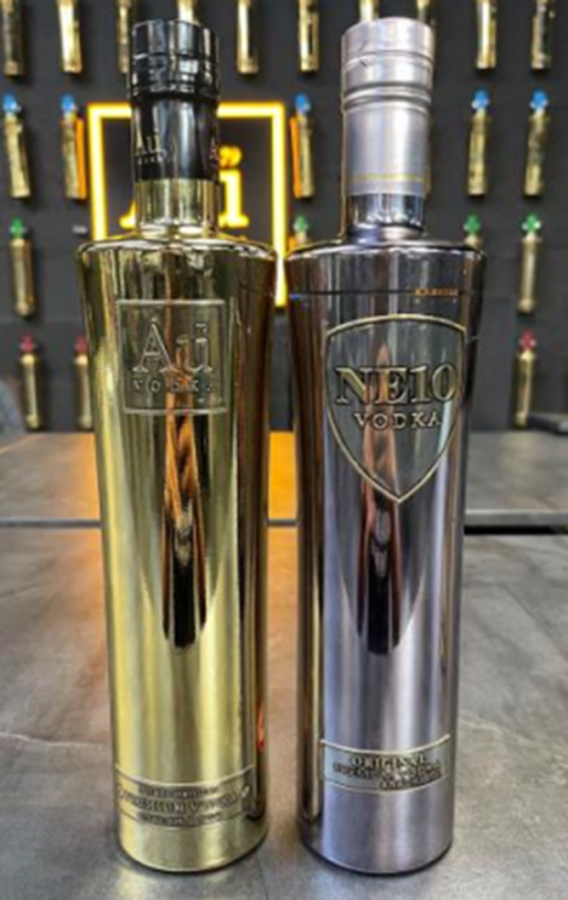Vodka Bottles, Passing Off and Protecting Product Packaging

In a recent case involving claims of passing off between two competing vodka brands, the UK High Court has held that “there is no tort of copying” despite there being clear similarities between the products concerned. Our Intellectual Property team considers the implications of the decision for brand owners in the drinks industry.
A recent UK High Court case concerning two competing vodka brands has served a timely reminder of the difficulties with establishing a claim under the tort of passing off regarding product get-up. AU Vodka Limited, a premium vodka brand which launched in 2015 and which has experienced significant growth since 2019, claimed that the rights in the get-up and appearance of its vodka bottle had been copied by NE10 Vodka Limited and its founding director, Leon Hogan. In ultimately refusing the applicant's claim for an interim injunction in the case, the UK High Court emphasised that “there is no tort of copying.” Rather, to succeed in a claim for passing off, there must be “deception” by the copier. On the facts before it, the Court was happy to assume that the defendants did in fact copy AU Vodka’s product. However, the Court held that that alone did not mean that the defendants intended to trade off the applicant's reputation for the purposes of passing off. This is clearly a high bar to meet for brand owners who do not have the luxury of being able to rely on registered IP rights when instituting proceedings against copiers and infringers. Although the decision is from the UK, it will have persuasive authority for Irish Courts when dealing with similar passing off cases.
AU Vodka’s range of flavoured vodka drinks are sold in gold metallic bottles, with a label near the top with the words “AU Vodka” and a smaller rectangular label towards the base of the bottle identifying the flavour. In contrast, the first defendant was incorporated in September 2021 with the Second Defendant being its sole director and majority shareholder. The defendants launched their range of NE10 vodka drinks in August 2022. Their bottles appeared in the colour silver, blue or pink. A comparison of the competing vodka bottles at issue is shown below.

Within two weeks of the launch of NE10 Vodka and following the issuing of two separate letters before action by AU Vodka, High Court proceedings claiming passing off were instituted by AU Vodka.
Ultimately in refusing the interim injunction application, the UK High Court reiterated the ‘classic trinity’ test derived from the case of Reckitt & Colman Ltd v Borden Inc (commonly referred to as the “Jif Lemon” case). That is, to establish passing off, AU Vodka would need to establish that:
- Goodwill or reputation attaches to the goods that they supply in the minds of the purchasing public by association with the identifying ‘get up'
- The defendants made a misrepresentation to the public, whether intentional or not, which led the public to believe that the goods offered by the defendant were those of AU Vodka, and
- Damage was suffered by reason of the incorrect belief that the defendant’s goods are the same as those offered by AU Vodka
On the first point, the Court was satisfied that the evidence submitted by AU Vodka demonstrated that there was “no doubt” that AU Vodka had a reputation in the appearance of its products. Regarding the question of misrepresentation, while the Court accepted the “extremely close” shape and dimensions of the competing bottles, it held that other similarities had been “expressed at a level of abstraction which is divorced from what ordinary consumers perceive and carry in their heads.” Thirdly on the question of damage, it held that actual or likelihood of deception must be established in passing off as opposed to mere consumer confusion, or the likelihood of it. Although there was a serious issue to be tried on passing off, the Court held that the balance of convenience favoured the defendants, and much will depend on the evidence put forward at the full trial of the case.
Conclusion
Although not the end of the matter, the decision in the interim injunction application should provide a warning to brand owners of the need to seek trade mark and/or design registrations for their key product packaging components at the earliest possible juncture. The applicant in this case, for example, would not have had to rely on the common law tort of passing off to bring a claim if it had registered trade marks or designs to rely on and enforce. Otherwise, the decision reinforces the difficulties of trying to establish a passing off claim based on product get up alone. To that end, the Court held that even where a product is ‘distinguishable,’ this simply means ‘different’ which does not equate to distinctiveness in the trade mark sense. This is unquestionably a high bar to meet and there are lessons to be learned for brand owners.
For more information about registering trade marks and defending your organisation’s IP rights, contact a member of our Intellectual Property team.
The content of this article is provided for information purposes only and does not constitute legal or other advice.
Share this:



